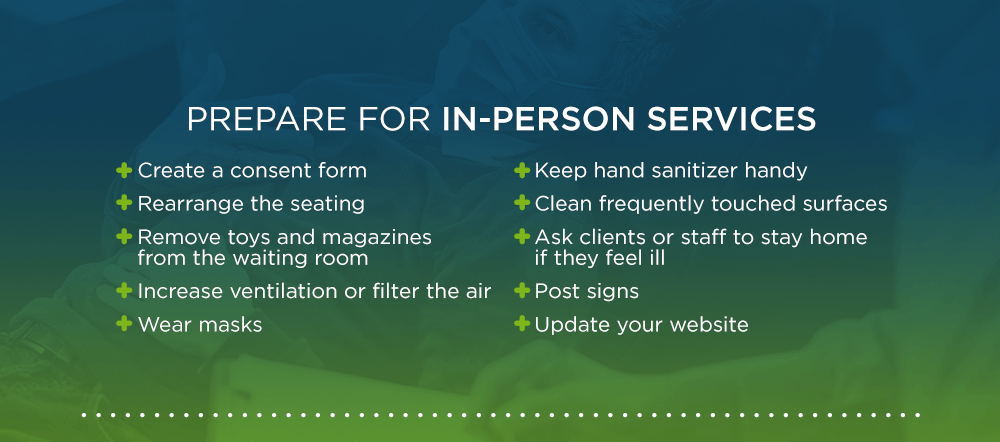COVID-19: When Is It OK to Resume In-Person Mental Health Services?

For many Americans, maintaining mental health during the COVID-19 pandemic hasn't been easy. According to a June 2020 survey, 40% of U.S. adults claimed they struggled with a mental health issue or substance use — a substantial increase from 2019. Of the respondents with a mental health or substance use problem, 31% had anxiety or depression symptoms.
It's clear that the coronavirus pandemic has led to stress, loneliness, anxiety or fear for many Americans and increased demand for mental health services. However, it's not so clear whether behavioral health professionals should resume in-person sessions despite the demand. There are many factors to consider before deciding to meet with clients in person.
If you're a therapist, psychologist or another behavioral health professional who's wondering when to invite clients back into your office, this post will help you decide when to offer face-to-face sessions again and provide tips to prepare for these visits during the pandemic.
Table of Contents
- Understand State Guidelines and Recommendations
- Consider the Mental and Physical Risks
- Prepare for In-Person Services
- Consider Using a Telehealth Platform
- Request Your Free Trial of ICANotes
Understand State Guidelines and Recommendations
Before you resume in-person therapy sessions, it's a good idea to check your state's guidelines and recommendations first. While some states have eased their stay-at-home or shelter-in-place orders, others have tightened their restrictions. You can visit the American Psychiatric Association or the American Psychological Association (APA) for state-by-state guidance relating to the coronavirus.
Consider the Mental and Physical Risks
Some clients may be wondering how to get help with mental health during the COVID-19 pandemic, especially if they do not wish to use telehealth services. However, even if existing or potential clients insist on meeting you in person, you are not obligated to fulfill their wishes if it's too risky. It's up to you whether you feel comfortable meeting with clients in-person again.
If you want to resume in-office visits, it may help to review the mental and physical risks associated with each individual. For example, if a particular client's mental health has declined since you stopped offering in-person services, you might ask them to come in for an appointment. Likewise, clients who are in crisis or need more intense care may benefit from face-to-face therapy sessions.
Also, think about each client's physical health. Clients who have an underlying medical condition such as Type 2 diabetes or heart disease are at increased risk of severe illness if they contract the coronavirus. To help protect clients with certain medical conditions, you may want to avoid in-person appointments and continue with telehealth sessions.
Be sure also to consider how different clients might bring a higher risk of spreading the coronavirus in your office. Before offering an in-person session to a client, think about their occupation and behaviors and if they're at a greater risk of catching the coronavirus and spreading it to others.
Prepare for In-Person Services
If you decide to resume in-person services, you can take several steps to prepare for the transition and help keep yourself, employees and clients safe. Here are some tips:
- Create a consent form: Create a consent form describing safety precautions you and clients will take to reduce exposure to the coronavirus. You can include this document with your practice's informed consent and other essential forms. The APA created a sample consent form to help you get started, which you can modify to suit your community's guidelines and your clients' needs.
- Rearrange the seating: The Centers for Disease Control and Prevention (CDC) recommends placing chairs 3 to 6 feet apart if possible. You might also consider placing barriers in the waiting area to keep clients separate.
- Remove toys and magazines from the waiting room: Remove any magazines, books or toys in the waiting area to help prevent the spread of germs.
- Increase ventilation or filter the air: If possible, keep the windows open to bring in outdoor air. If that would make your office too uncomfortable, consider using portable air purifiers or high-efficiency particulate air (HEPA) filters to clean the air.
- Wear masks: Be ready to wear a mask and provide masks for your employees. Make sure your clients know you expect them to wear masks as well, and keep extra masks on hand for those who don't bring one.
- Keep hand sanitizer handy: Make sure clients and staff have easy access to hand sanitizer that contains at least 60% alcohol.
- Clean frequently touched surfaces: Try to clean and disinfect frequently touched surfaces at least once a day. Some items, like credit card processors, should be sanitized after each use. Also, remind employees not to share computer keyboards or phones without cleaning them first.
- Ask clients or staff to stay home if they feel ill: In your consent form, ask clients to stay home if they show signs of illness or have been exposed to someone who has COVID-19. Ensure clients understand they will not be charged a fee if they cancel an appointment last minute due to COVID-19 symptoms or exposure. Be sure employees also know they are expected to stay home if they potentially have COVID-19.
- Post signs: Post signs throughout your office reminding clients and staff to wash their hands and avoid touching their faces. You might also post signs on your front door that clients can read before they enter. The CDC has downloadable signs you can print from your computer.
- Update your website: Ensure your practice's website explains how you and your employees work to make your office as safe as possible. Also, include your office's COVID-19 policies. You can use your website to help clients feel more comfortable and show them what you expect of everyone who enters your office.
Consider Using a Telehealth Platform
If you've realized that you're still not comfortable resuming mental health practices in person, or if your state's guidelines advise against it, you can continue serving clients through a telehealth platform. Using a telehealth platform, you can hold video sessions with clients and avoid putting them or yourself at risk of exposure to germs.
You and your clients will also enjoy other benefits associated with teletherapy, such as flexible scheduling and hassle-free appointments. To offer teletherapy services, you'll generally need the following:
- A secure platform that's compliant with the Health Insurance Portability and Accountability Act (HIPAA)
- A computer with a camera, speaker and microphone
- A fast and reliable internet connection
- Malpractice insurance that covers teletherapy services
- A quiet, private room
Before you start counseling patients via videoconferencing, also review your state's teletherapy laws and regulations.
Request Your Free Trial of ICANotes
The coronavirus has undoubtedly impacted mental health and led to increased demand for mental health services. However, despite the great need for mental health care, therapists shouldn't have to put themselves at risk when they have the option to offer their services remotely. If you're not ready to resume in-person appointments for all or some of your clients, ICANotes can help.
ICANotes is comprehensive, electronic health record (EHR) software designed for the behavioral health field. With ICANotes, you can add a secure, HIPAA-compliant telehealth feature to your plan and start virtual therapy sessions right away. In addition to the easy-to-use telehealth platform, you'll also have access to time-saving features such as customizable note-taking templates, automatic appointment reminders and more. Overall, ICANotes can help you run an efficient practice, whether you work remotely or decide to reopen your office. To learn more about ICANotes, request your free trial or contact our support team today.
Related Posts
COVID-19 and Your Therapy Practice
Self Care for Behavioral Health Professionals
Supporting Emotional Wellbeing During the Coronavirus Pandemic
Tips for Having a Successful Teletherapy Appointment
What You Should Know Before Using Teletherapy for Mental Health Counseling
Virtual Group Therapy: The Latest Trends & How Your Practice Can Adapt
Sources:
- https://www.cdc.gov/mmwr/volumes/69/wr/mm6932a1.htm#:~:text=Overall%2C%2040.9%25%20of%20respondents%20reported,increased%20substance%20use%20to%20cope
- https://www.cdc.gov/coronavirus/2019-ncov/daily-life-coping/managing-stress-anxiety.html#:~:text=The%20coronavirus%20disease%202019%20(,services%20you%20rely%20on.
- https://navigatingtheinsurancemaze.com/returntoofficeconsent/
- https://www.usatoday.com/storytelling/coronavirus-reopening-america-map/
- https://www.psychiatry.org/psychiatrists/covid-19-coronavirus/practice-guidance-for-covid-19
- https://www.apaservices.org/practice/clinic/covid-19-telehealth-state-summary
- https://www.apaservices.org/practice/news/in-person-services-covid-19
- https://www.cdc.gov/coronavirus/2019-ncov/need-extra-precautions/people-with-medical-conditions.html
- https://www.apaservices.org/practice/clinic/covid-19-informed-consent
- https://www.cdc.gov/coronavirus/2019-ncov/hcp/guidance-hcf.html#outpatient-ambulatory
- https://www.cdc.gov/coronavirus/2019-ncov/downloads/Clinic.pdf
- https://www.epa.gov/coronavirus/air-cleaners-hvac-filters-and-coronavirus-covid-19
- https://www.cdc.gov/coronavirus/2019-ncov/community/disinfecting-building-facility.html
- https://www.cdc.gov/coronavirus/2019-ncov/communication/print-resources.html?Sort=Date%3A%3Adesc
- https://www.nbcnews.com/news/us-news/therapists-are-under-strain-covid-era-counseling-clients-trauma-they-n1230956


